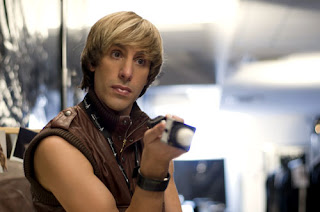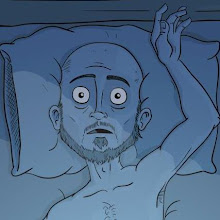
Right, so we’re at film six in the Harry Potter saga.
Harry Potter And The Half-Blood Prince is the penultimate book, but not the penultimate film, as The Deathly Hallows is split into two parts, in order to fit all the story elements in. Or all the dollars they can squeeze out of us. But that’s probably just the cynic in me speaking. Taking place six months after Harry’s godfather Sirius Black was unceremoniously killed off, it’s a dark time for the kids of Hogwarts. Looks like bad boy Voldermort’s gonna wreck things up something awful. But while a dark tone overtakes the series, does the film hold up against the previous films?
Sirius Black is dead. Voldermort is gaining strength. And Harry can’t get a date. All in all, things aren’t exactly great for teenager Harry Potter. But we’ve all had to deal with those awkward teenage years where the undead murderer of our parents is trying to kill us with magic. Ho-hum! But the Dark Lord and his band of Death Eaters aren’t the only threat to the kids of Hogwarts. Raging hormones are sweeping through the halls of the school like the smell of a hundred unflushed turds and nobody’s safe. Harry’s fending off love-potion wielding wenches with a pointed stick... eh, his wand. While the real object of his affection is his best friend’s sister, and she has her tongue down the throat of another guy. While making eyes at Harry. It’s all very Dawson’s Creek. Meanwhile, Harry’s come into possession of a potions book that belonged to someone known only as the Half-Blood Prince. While the book does help Harry ace his potions class, his professor is a man of a questionable history, whom Dumbledore wants Harry to get to know. There is something in Professor Slughorn’s past that links him to Voldermort. Harry must find out what that is.

I’ve never been a huge fan of the Harry Potter series. I pretty much hated the first two films, and while the subsequent three films were far better, there’s always been something a little twee about the series. Maybe it’s the names of the characters and situations, that they’re all head-slapping puns. Maybe it’s the fact that all the heroes are kids. But then, you did have characters like Sirius Black and Mad-Eye Moody who were pretty badass. Anyway, it was with a sense of relief that I was told by a Potter-fan friend of mine that this story ups the ante somewhat. But that was the book. Something was lost in the film translation. I was aware of a pretty big story element that was going to happen and was ready for some gut-wrenching emotion. But really, I was left cold.
There’s nothing inherently wrong with Harry Potter and the Half-Blood Prince, but it does have quite a few flaws that, when added up, detract from the overall experience. Primarily, there is a distinct lack of urgency in the film. Voldermort is gaining strength and his agents are attacking even the muggle world now. Yet, nobody in Hogwarts seems that worried about it. Sure, there is some talk about how the parents of the students are concerned about sending them back to school, but that’s about it. Dumbledore isn’t too concerned with Harry’s safety and stays in the background for most of two thirds of the film. It’s only in the final third of the film that he really leaps to life. And that in itself is a big problem. The majority of the film doesn’t seem to deal with any of the overall plot that runs through the entire series. I thought that Harry Potter dealt with the sole survivor of an attack by the evilest wizard in the history of magic and his attempt to defend himself and ultimately defeat the Dark Lord. What we have for the majority of the film is a series of bumbling encounters with kids driven by their discovery of hormones and the opposite sex. The whole Half-Blood Prince aspect is merely mentioned and feels like even a tertiary subplot. A more appropriate title would have been Harry Potter And The Sexual Awakening. But then that wouldn’t have gotten past the draft stage.

The great characters played by heavy-weight actors are also sadly missing from the film. There’s no Gary Oldman’s Sirius Black. There’s no Brendan Gleeson’s Mad-Eye Moody. There’s no Jason Isaac’s Lucius Malfoy. Even Ralph Fiennes, Voldermort is missing for Christ sake. Now, other than Moody, there are legitimate reasons as to why these characters are absent. But the film feels like it’s missing something without these characters. Only David Thewlis’ Remus Lupin and Alan Rickman’s Severus Snape pop up, and even those are mere cameos. I was informed Snape really comes into his own in this story, and after seeing the film, you can see how he would have, but his character feels castrated. It’s kind of a big disappointment.
I have to say, most of the actors who play the kids have really come into their own over the course of the series. In particular, Tom Felton who plays Draco Malfoy and Rupert Grint who plays Ron Weasley have come pretty far. Felton in particular has a pretty important role in this film and he carries himself very well, even when playing off a seasoned veteran like Alan Rickman. Even Emma Watson pulls of her wide range of emotions very well. The same can’t be said for Daniel Radcliffe, however. His acting started off bad and hasn’t gotten any better really. At one point, I thought I’d missed a plot point where somebody sucked out Harry’s soul, because Radcliffe emoted with all the soul of a marionette. Thankfully Radcliffe is surrounded by a pretty heavyweight cast, so he’s naturally propped up by that.

David Yates’ direction is good enough for the series. It’s not exactly ground-breaking as he seems to have lifted bits from Alfonso Cuaron and a great deal of other directors for this film. Which is ironic, as in the last film, I felt his direction was dull at best. In this film, however, at moments, I felt like a was watching a best of compilation of other directors’ work, and in one particular scene which shall remain unnamed, I thought somebody had accidentally spliced in some footage from Fellowship Of The Ring. Naturally, there are elements of each series that are similar. But for a director to use a shot that was pretty much identical to another film is just lazy. And it’s down to Yates that there was no sense of urgency in the film. Sure, there was a lot of plot to get through, and fair dues, the film never really ground to a halt at any moment. But the best bits were flashbacks, moments that involved Severus Snape and the Death Eaters. All of which were secondary to the main plot.
Harry Potter And The Half-Blood Prince isn’t a great film. And it is nowhere near as good as The Prisoner Of Azkaban, which is still by a great deal the best film of the franchise. But The Half-Blood Prince isn’t terrible either. I realise that there was a hell of a lot of plot to get through. But other films have had the same task and handled it far better. There is just something inherently lacking in this film. Maybe it’ll become clear after seeing The Deathly Hallows, which this film feels somewhat of a set-up for. But this film is just a massive anti-climax. As the film ended, I wondered where the hell the action that was in the last film went. Especially after the huge plot point that had just passed. If Harry was to get a report card after this year in Hogwarts, it would read ‘A lot of potential wasted. Must do better.’
 6/10
6/10
 It’s amazing that films like Transformers 2 and Terminator Salvation make truck loads of cash. They’re empty-headed, dull, idiotic movies yet they have mass idiot-appeal and therefore bring the feckless masses into the cinemas to gawp at the screen and marvel at the shiny things and ‘splosions. And then you have a film like Duncan Jones’ Moon. A film that is playing in three cinemas in this country, yet is probably one of the best films you’ll see this year. Have the general public heard of it? Unlikely. It’s a sad indictment of the cinema industry.
It’s amazing that films like Transformers 2 and Terminator Salvation make truck loads of cash. They’re empty-headed, dull, idiotic movies yet they have mass idiot-appeal and therefore bring the feckless masses into the cinemas to gawp at the screen and marvel at the shiny things and ‘splosions. And then you have a film like Duncan Jones’ Moon. A film that is playing in three cinemas in this country, yet is probably one of the best films you’ll see this year. Have the general public heard of it? Unlikely. It’s a sad indictment of the cinema industry.

 9/10
9/10



















